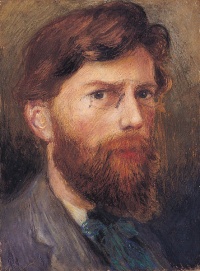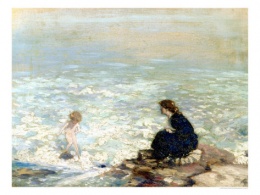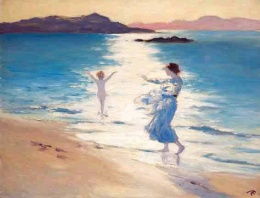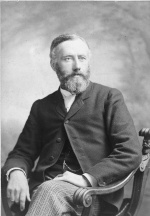George William Russell
George William Russell (April 10, 1867 – July 17, 1935) was an eminent Irish poet, painter and essayist who wrote with the pseudonym Æ (sometimes written AE or A.E.). He was a political activist and a key figure in the Irish Literary Revival.
Personal life and education
George William Russell was born April 10, 1867 at Lurgan, County Armagh, Ireland. He attended Rathmines School and then Metropolitan School of Art, Dublin, where he met William Butler Yeats.
He died July 17, 1935.
Literary career
"Many of Russell’s poems are of a mystical nature reflecting his theosophical beliefs."
Verse publications include; Homeward: Songs by the Way (1894); Collected Poems (1913); Collected Poems, 2nd edition (1926); Selected Poems (1935).
Art works
Political activities
"Russell was a political activist who threw himself wholeheartedly into Irish freedom movements, editing The Irish Statesman in 1923-30."
Theosophical Society involvement
Russell joined the Theosophical Society in 1887, and was a pupil of Madame Blavatsky when she was at Dublin the following year.[1]
"He was a lifelong student of theosophy and mysticism and claimed to see visions which inspired much of his poetry.In 1895 he followed the group headed by William Q. Judge that left the Adyar-based TS, but did not continue the association with that group after Judge’s death, electing to form the Hermetic Society."
He was deeply affected by H. P. Blavatsky's ideas.
A month before he died, he wrote in a letter to the Irish author Sean O'Faolein:
You dismiss H. P. Blavatsky rather too easily as "hocus pocus." Nobody ever affected the thought of so many able men and women by "hocus pocus." The real source of her influence is to be found in The Secret Doctrine, a book on the religions of the world suggesting or disclosing an underlying unity between all great religions. It was a book which Maeterlinck said contained the most grandiose cosmogony in the world, and if you read it merely as a romantic compilation, it is one of the most exciting and stimulating books written for the last hundred years. It is paying a poor compliment to men like Yeats, Maeterlinck, and others, to men like Sir William Crookes, the greatest chemist of modern times, who was a member of her society, to Carter Blake, F.R.S., the anthropologist, and the scholars and scientists in many countries who read H. P. Blavatsky's books, to assume that they were attracted by "hocus pocus." If you are ever in the National Library, Kildare Street, and have a couple of hours to spare, you might dip into "The Proem" to The Secret Doctrine, and you will understand the secret of the influence of that extraordinary woman on her contemporaries.[2]
Russell and William Quan Judge
In a letter to Carrie Rea, Russell wrote of his friend William Quan Judge:
I have sent you today... a book which I hope you will like Letters that have helped me. They are written by a man whom I consider the wisest and sweetest of any I have ever met W.Q.Judge (Z.I.Z.). I have more reverence for him than for an other human being I know of. I hope they will mean as much to you as to many of us. They are not badly written; but do not think of fine or beautiful phrases when reading the, but only of the things it is good to live with and ever to keep in mind. I think he says only things he knows.[3]
Online resources
Articles
- "AE" Poet and Theosophist by Boris de Zirkoff
Additional resources
- In Memoriam - George William Russell articles from the Canadian Theosophist
Notes
- ↑ Philip S. Harris "Russell, George William," Theosophical Encyclopedia (Quezon City, Philippines: Theosophical Publishing House, 2006), 542-543. Available at Theosopedia.
- ↑ William Kirkpatrick Magee, A Memoir of AE: George William Russell, (London:Macmillan & Co., Ltd., 1937), 164-5.
- ↑ George W. Russell letter to Carrie Rea. September 6, 1894. Transcriptin the "Judge materials"of Boris de Zirkoff Papers. Records Series 22. Theosophical Society in America Archives.



